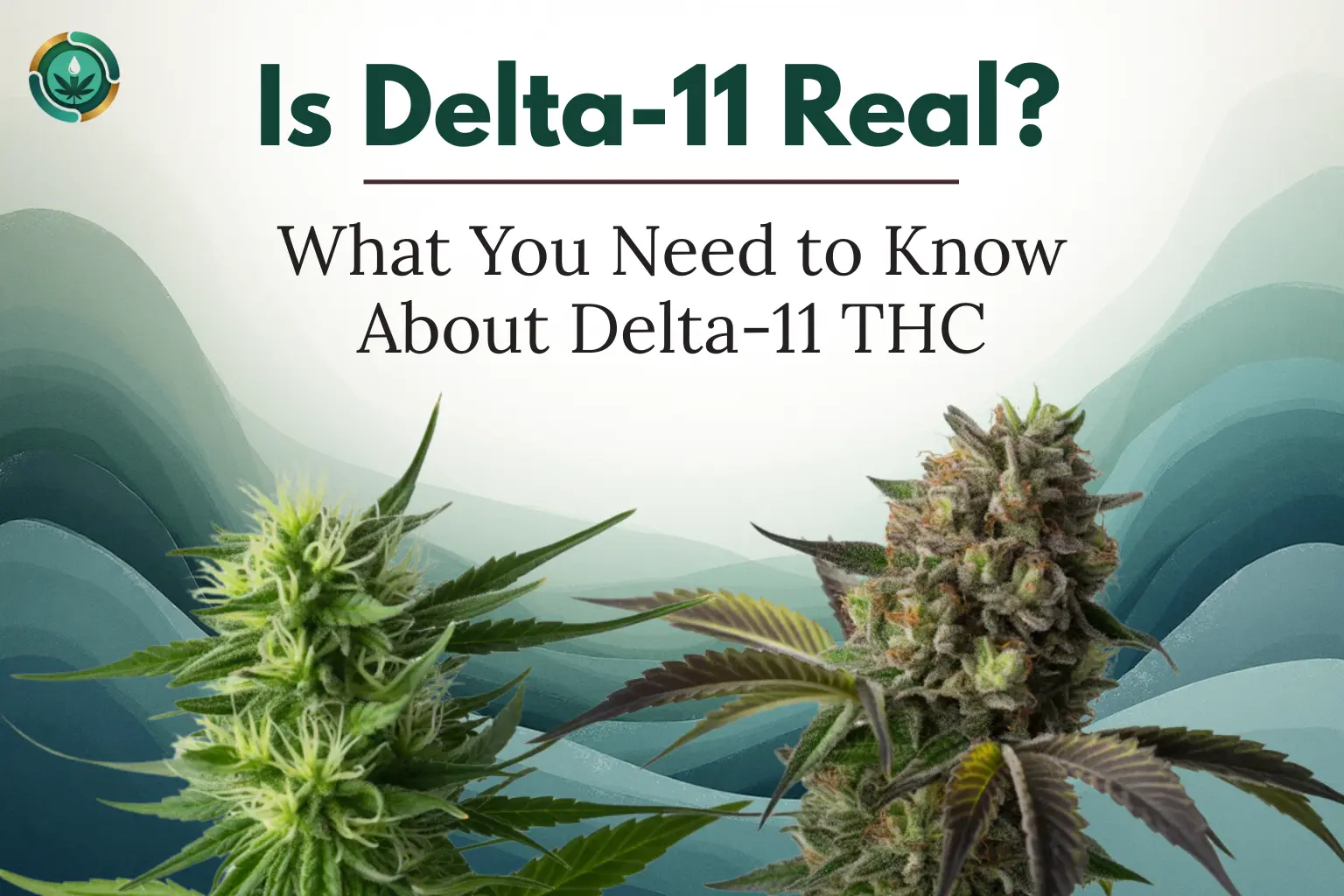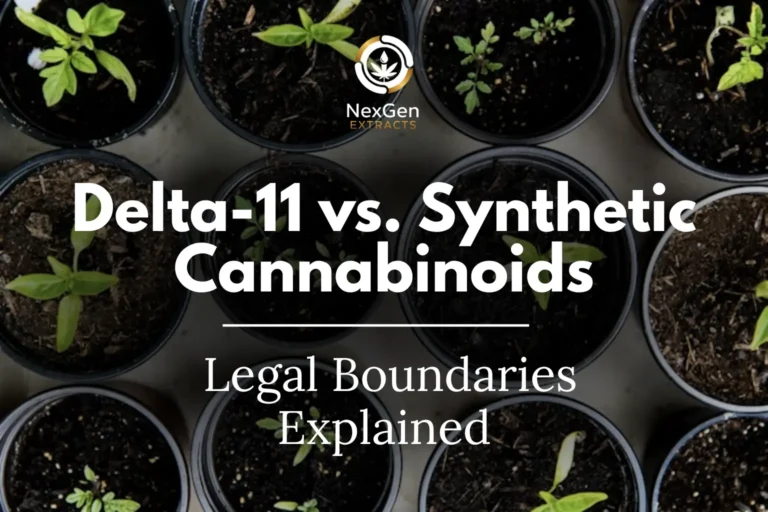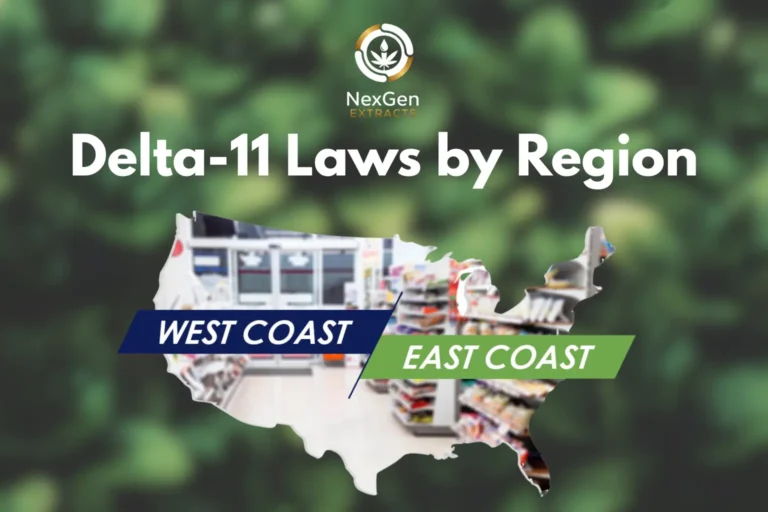
Delta-11 is one of the newest and most talked-about THC isomers on the market. Many people are curious whether it’s real or just another passing trend. In this complete guide, we’ll explain what Delta-11 THC is, how it works, what effects it may have, its legal status in the United States, and the most common product types — including Delta 11 Gummies and Delta 11 THCa.
What Is Delta-11 THC?
Delta-11 THC (also known as Δ¹¹-THC or exo-THC) is a rare chemical variation of tetrahydrocannabinol. Like Delta-8 and Delta-9 THC, it shares the same basic molecular structure but differs in the position of a double bond. This small change alters how it interacts with receptors in the body.
Scientists have known about Delta-11 since the 1970s, but it wasn’t until recently that it became commercially available. Natural cannabis plants contain only trace amounts of Delta-11, so most Delta-11 used in products is made through isomerization — a process that converts other cannabinoids, such as CBD or Delta-8 THC, into Delta-11.
Sometimes you’ll see “Delta-11 THCa” on product labels. This refers to an acidic precursor form that may turn into Delta-11 THC when heated. However, there is still limited scientific proof confirming how stable or effective Delta-11 THCa really is.
In short, Delta-11 is real, but it’s still a newcomer in cannabinoid science. Our understanding of its safety and benefits remains very limited.
How Does Delta-11 Work?
Research on Delta-11 is scarce, so most of what we know comes from reports by consumers and manufacturers. Like other THC isomers, Delta-11 likely interacts with the body’s endocannabinoid system by binding to CB1 receptors in the brain. This interaction produces psychoactive effects similar to those of Delta-8 or Delta-9.
Potency and Effects
Some users describe Delta-11 as stronger and more euphoric than Delta-8 but slightly less intense than Delta-9. Others find it smoother and more relaxing. These differences likely depend on purity, dosage, and individual body chemistry. Because the market is new and largely unregulated, product quality can vary significantly from brand to brand.
Possible effects may include relaxation, a mild sense of euphoria, enhanced mood, and body calm. At higher doses, some people experience sedation or a dreamy mental state.
Duration and Onset
If inhaled or vaped, Delta-11 may begin to take effect within minutes. When eaten in edibles like Delta 11 Gummies, effects usually appear after 30 to 90 minutes and can last for several hours. The delayed onset makes accurate dosing very important. Start low and increase gradually as needed.
Interaction with Other Cannabinoids
Like other THC isomers, Delta-11 may work synergistically with compounds such as CBD, CBG, or natural terpenes — a phenomenon known as the entourage effect. This combination could enhance relaxation or mood balance, though this is still theoretical.
Legal Status of Delta-11 in the United States
One of the biggest sources of confusion about Delta-11 THC is its legality.
Federal Status
The 2018 Farm Bill made hemp and hemp-derived compounds legal in the United States, as long as the final product contains less than 0.3% Delta-9 THC by dry weight. Delta-11 THC is not mentioned by name in this law.
Because of that, many companies claim Delta-11 is federally legal when derived from hemp. However, some experts argue it could still be considered a controlled substance under the Federal Analogue Act, which treats unapproved THC variants as illegal if they are chemically similar to Delta-9 and intended for human use.
This means Delta-11 exists in a legal gray area — not clearly banned, but not explicitly protected either.
State Laws
State-level regulations differ widely. Some states, like California and Texas, still allow hemp-derived cannabinoids including Delta-11. Others have banned all psychoactive hemp products, which would include Delta-11 regardless of Delta-9 content.
Because the rules change often, consumers should always check local laws before purchasing or using Delta-11 products.
Safety and Regulation
Since the federal government has not set clear manufacturing or testing standards for Delta-11, product safety depends entirely on the producer. Reputable brands provide third-party lab tests that confirm potency, purity, and absence of harmful chemicals. Unverified products, however, may contain unsafe residual solvents, synthetic byproducts, or even mislabeled isomers.
For this reason, choosing only lab-verified brands is critical for safety.
Popular Delta-11 Product Types
As interest grows, Delta-11 is being used in a variety of product forms.
Delta 11 Gummies
These edibles are one of the most popular formats. Each gummy contains a measured dose of Delta-11 THC, allowing for consistent and discreet use. They’re ideal for beginners who prefer not to inhale vapor or smoke. Because edibles take longer to kick in, users should always start with one gummy and wait before taking more.
Delta 11 THCa
Delta 11 THCa refers to an unheated version of the compound, typically found in raw hemp or specialized concentrates. When heated, it may convert into active Delta-11 THC. However, because this conversion is still not fully verified in research, most effects depend on how the product is processed.
Vapes and Cartridges
Delta-11 vape carts provide fast-acting effects and are easy to control. However, quality is crucial. Only buy from brands that provide lab reports verifying there are no residual solvents or harmful additives.
Oils and Tinctures
Some companies are experimenting with Delta-11 oils or sublingual tinctures. These can be placed under the tongue for quicker absorption. They are a good middle ground between edibles and vaping.
Hybrid Blends
Many products combine Delta-11 with other cannabinoids like Delta-8, Delta-10, or CBD to balance out the effects. These blends can create different experiences depending on the ratios used.
How to Choose Safe Delta-11 Products
Because Delta-11 is still new and lightly regulated, it’s important to buy carefully. Here’s how to stay safe:
- Always check that a product comes with a verified Certificate of Analysis (COA) from an independent lab.
- Ensure the lab report lists potency, cannabinoid profile, heavy metal screening, and solvent results.
- Verify that the Delta-9 THC level stays below 0.3%, as required by federal law.
- Avoid any brand that does not publish full testing results.
- Choose companies that are transparent about their ingredients and extraction methods.
- Start with a low dose and wait to gauge your body’s reaction before increasing.
- Never use Delta-11 alongside alcohol, sedatives, or prescription medication without consulting a doctor.
Potential Benefits and Side Effects
Because scientific research is still limited, all potential benefits and risks are based on early observations.
Reported Benefits
Users often report mild euphoria, relaxation, stress relief, or mood enhancement. Some also describe relief from physical tension or a pleasant body calm. In lower doses, it may help promote creativity or focus, while higher doses can feel more sedative.
Possible Side Effects
As with other psychoactive cannabinoids, too much Delta-11 may cause dizziness, confusion, anxiety, or fatigue. In rare cases, it may increase heart rate or cause nausea. The main risk lies in inconsistency — because purity and potency vary by brand, effects can differ significantly.
Anyone subject to drug testing should know that Delta-11 will likely trigger a positive THC result, as standard tests cannot distinguish between THC isomers.
Comparing Delta-11 to Other THC Isomers
To understand Delta-11 better, it helps to compare it to familiar cannabinoids.
Delta-9 THC is the classic form found in marijuana and is responsible for the well-known cannabis high. Delta-8 THC offers a gentler, more clear-headed version of the experience and is widely used in hemp-derived products. Delta-10 THC is milder still, often described as uplifting or energizing.
Delta-11 seems to sit somewhere between Delta-8 and Delta-9 in potency. It may produce a more balanced and smooth high, but because the data is new, exact comparisons remain uncertain.
The Future of Delta-11 THC
Delta-11 THC represents an exciting yet uncertain frontier in cannabinoid science. The compound’s novelty means researchers have only scratched the surface of its potential effects and risks.
Key scientific gaps still need exploration:
- How strongly Delta-11 binds to cannabinoid receptors.
- How long it stays in the body and how it breaks down.
- Whether Delta-11 THCa can safely and effectively convert into active THC.
- Long-term effects of frequent use.
- How laws will evolve as more states regulate synthetic and hemp-derived cannabinoids.
As the market develops, more studies will clarify Delta-11’s true profile. For now, education, transparency, and careful product selection are the best tools consumers have.
Final Thoughts
So, is Delta-11 real? Yes — it’s a genuine THC isomer that can be synthesized from hemp-derived compounds. However, its safety, strength, and long-term effects are still being studied. The lack of regulation and research makes it a compound to approach with caution.
Consumers should always choose verified brands that publish lab results, such as those offering Delta 11 Gummies or Delta 11 THCa with clear batch testing. Start low, stay informed, and always follow local laws.
Delta-11 may represent the next chapter in hemp innovation, but it’s still in its early pages. Used responsibly and with proper awareness, it could become a meaningful addition to the evolving world of cannabinoids.


